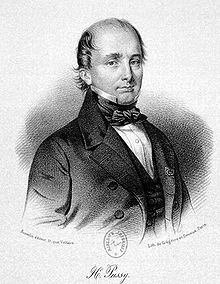Hippolyte Passy
Hippolyte Passy (born October 16, 1793 in Garches (in what is now the Hauts-de-Seine department ), † June 1, 1880 in Paris ) was a French politician and economist .
Life
Hippolyte Passy went into the military, entered the cavalry school in Saumur in 1809 , took part in Napoleon's last wars since 1812 , but was dismissed with the degree of hussar lieutenant in 1815 after the battle of Waterloo and the associated final overthrow of the French Empire . Later he took an interest in politics, approached the liberal opposition and worked for several newspapers as well as a co-founder of the National .
Passy began his political career only after the July Revolution of 1830 . In that year he was elected to the Chamber of Deputies for Louviers and soon distinguished himself by his great expertise in the budget negotiations of 1831 and 1832, so that he was almost a permanent member of the commissions for reviewing the financial proposals. As an economist of the political center left, he joined the animal party, in which he was considered one of the best speakers. When this middle party converted to the opposition in 1834 and King Louis-Philippe I felt compelled to elect the new ministry from among the semi-liberals, Passy became finance minister in the cabinet led by the Duke of Bassano on November 10, 1834 . However, he and his colleagues had to give way to his predecessors after just eight days, since the king refused to give in to them and they opposed him with firmness. In December 1834 he was elected Vice-President of the Chamber of Deputies and retained this function, interrupted only by his tenure as minister, until 1839. He approached the court more closely in 1835 and that year voted with his party comrade Sauzet for the September laws .
On February 22nd, 1836, Adolphe Thiers brought about a cabinet with the help of the animal party, in which Passy took over the portfolio of trade and construction. But already in August 1836 all ministers abdicated because they saw themselves compromised in Spanish affairs by the king. In the Chamber of Deputies, Passy now adhered to the Thiers coalition, which promoted the overthrow of the Molé ministry . However, when this was enforced in 1839, he separated from the coalition and tried to form a ministry from his friends in the interests of the court, but this failed. On April 14, 1839, he took over the presidency of the Chamber of Deputies and, on May 12, 1839, brought about a cabinet made up of the most varied of elements, of which he was the actual head with the portfolio of finances, while Marshal Soult was at its head as Minister for Foreign Affairs . The defeat which this ministry suffered in February 1840 with the requested endowment of the Duke of Nemours in the Chamber of Deputies caused its overthrow on the following March 1st. Since then, Passy belonged to the opposition until he was promoted to Peer of France on December 16, 1843 . In 1838 he had become a member of the Académie des sciences morales et politiques in place of the late Talleyrand , and on April 24, 1845 he was appointed commander of the Legion of Honor .
Despite his opposition role during the later reign of King Louis-Philippe I, Passy was not elected to the constituent assembly in 1848, but was appointed finance minister in the cabinet led by Odilon Barrot by Louis-Napoléon Bonaparte on December 20, 1848 . In this capacity, he refused to lower the salt tax and proposed tax surcharges on gifts, inheritances and goods belonging to the Dead Hand and the reintroduction of the beverage tax to cover the budget deficit of 1850 . On May 13, 1849, he was elected simultaneously in the Eure and Seine departments as a deputy to the legislative assembly; he chose the former. During the government reshuffle on June 2, 1849, he remained at his post, but resigned it to Achille Fould on October 31, 1849 . In the legislative assembly became a member of several commissions, voted in July 1851 for the constitutional revision, was rapporteur on the budget of 1852 and was elected to the permanent commission. After the coup d'état of Louis Napoléon Bonaparte on December 2, 1851, he withdrew from political life and devoted himself to economic and political work. He died in Paris on June 1, 1880 at the age of 86.
Works
- De l'aristocratie dans ses rapports avec les progrès de la civilization , Paris 1826
- Des systèmes de culture et de leur influence sur l'économie sociale , Paris 1846, 2nd edition 1853
- Des causes de l'inégalité des richesses , Paris 1848
- Des formes de gouvernement et de lois qui les régissent , 1872
- Histoire et les sciences sociales et politiques , 1879
literature
- Passy, Hippolyte . In: Meyers Konversations-Lexikon , 0th edition, 2nd section, 2nd volume (1848), p. 900 f.
- Passy, Hippolyte . In: Meyers Konversations-Lexikon , 4th edition, 17th volume, p. 645 f. ( online ).
| personal data | |
|---|---|
| SURNAME | Passy, Hippolyte |
| BRIEF DESCRIPTION | French politician and economist |
| DATE OF BIRTH | October 16, 1793 |
| PLACE OF BIRTH | Garches , Hauts-de-Seine department |
| DATE OF DEATH | June 1, 1880 |
| Place of death | Paris |
